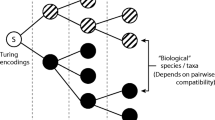Abstract
Some evolutionary psychologists contend that the best way to discover the functions of our present psychological systems is by appealing to the notion of functional mesh, that is, the assumed tight fit between a trait's design and the adaptive problem it is supposed to solve. In this paper, I argue that there exist theoretical considerations and empirical evidence that undermine this assumption of optimal design. Instead, I suggest that cognitive systems are constrained by what I call bounded functionality. This proposal makes use of Jacob's (1977) notion of evolution as a bricoleur and Simon's (1981) idea that problems can have ``satisficing'' solutions. Functional mesh will thus be shown to neglect constraints that are necessary to explain the evolution of psychological mechanisms.
Similar content being viewed by others
References
Barkow, J., L. Cosmides and J. Tooby (1992), The Adapted Mind: Evolutionary Psychology and the Generation of Culture. New York: Oxford University Press.
Cooper, L.A. and Munger, M. P. (1993), ‘Extrapolating and Remembering Positions along Cognitive Trajectories: Uses and Limitations of Analogies to Physical Motion’. in N. Eilan, R. McCarthy and B. Brewer, eds., Spatial Representation, Oxford: Basil Blackwell
Cosmides, L. and Tooby, J. (1987), ‘From Evolution to Behavior: Evolutionary Psychology as the Missing Link’, in J. Dupre, ed., The Latest on the Best: Essays on evolution and optimality, Cambridge, MA: MIT Press.
Cosmides, L. and Tooby, J. (1994), ‘Beyond Intuition and Instinct Blindness. Toward an Evolutionary Rigorous Cognitive Science’, Cognition 50, pp. 41–77.
Cummins, D.D. and Cummins, R. (1999), ‘Biological Preparedness and Evolutionary Explanation’, Cognition 73, pp. B37–B53.
Davies, P.S. (1996), ‘Discovering the Functional Mesh: On the Methods of Evolutionary Psychology’, Minds and Machines 6, pp. 559–585.
Davies, P.S., Fetzer, J. and Foster, T. (1995), ‘Domain Specificity a Social Exchange Reasoning: A Critique of the Social Exchange Theory of Reasoning’, Biology and Philosophy 10, pp. 1–37.
Dawkins, M. S. (1995), Unravelling Animal Behaviour, London: Longman.
Dawkins, R. (1982, 2nd ed. 1999), The Extended Phenotype, Oxford: Oxford University Press.
Dehaene, S. (1992), ‘Varieties of Numerical Abilities’, Cognition 44, pp. 1–41.
Dehaene, S. (1997), The Number Sense. How the Mind Creates Mathematics, New York: Oxford University Press.
Dennett, D.C. (1995), ‘Cognitive Science as Reverse Engineering: Several Meanings of “Top Down” and “Bottom Up”,’ in D. Prawitz, B. Skyrms and D. Westertahl, eds., Proceedings of the 9th International Congress of Logic, Methodology and Philosophy of Science, North Holland.
Dennett, D.C. (1996), Darwin's Dangerous Idea, New York: Touchstone.
Getty, T. (1988), ‘Review. Foraging Theory’, Animal Behavior 36, pp. 626–628.
Gilman, D. (1996), ‘Optimization and Simplicity: Computational Vision and Biological Explanation’ Synthese 107, pp. 293–323.
Gould, S.J. and Vrba, E.S. (1982), ‘Exaptation – Missing Term in the Science of Form’, Paleobiology 8, pp. 4–15
Jacob, F. (1977), ‘Evolution and Tinkering’, Science 196, pp. 1161–1166.
Marr, D. (1982), Vision, Cambridge, MA: MIT Press.
Millikan, R. (1984), Language, Thought and Other Biological Categories, Cambridge, MA: MIT Press.
Millikan, R. (1989a), ‘In Defence of Proper Functions’ Philosophy of Science 56, pp. 288–302
Millikan, R. (1989b), ‘An Ambiguity in the Notion of “Function”’, Biology and Philosophy 4, 172–176.
Mundale, J. and Bechtel, W. (1996), ‘Integrating Neuroscience, Psychology, and Evolutionary Biology Through a Teleological Conception of Function’, Minds and Machines 6, pp. 481–505.
Myers, J.P. (1983), ‘Commentary: Optimal Foraging’, in A.H. Brush and G. A. Clark, eds., Perspectives in Ornithology, Cambridge: Cambridge University Press, pp. 216–221.
Peacocke, C. (1993), ‘Intuitive Mechanics, Psychological Reality and the Idea of a Material Object’, in N. Eilan, R. McCarthy and B. Brewer, eds., Spatial Representation. Oxford: Basil Blackwell.
Pittendrigh, C.S. (1958), ‘Adaptation, Natural Selection, and Behavior’, in A. Roe and G.G. Simpson, eds., Behavior and Evolution New Haven: Yale University Press.
Radner, R. (1975), ‘Satisficing’, Journal of Mathematical Economics 2, 253–262.
Real, L.A. (1988), ‘The Economics and Psychology of Foraging’, Evolution 42, 637–638.
Rode, C., Cosmides, L., Hell, W. and Tooby, J. (1999), ‘When and Why do People Avoid Unknown Probabilities in Decisions under Uncertainty? Testing Some Predictions from Optimal Foraging Theory’, Cognition 72, pp. 269–304.
Simon, H. (1981), The Sciences of the Artificial, Cambridge, MA: MIT Press.
Warrington, E.K. (1982), ‘The Fractionation of Arithmetical Skills: A Single Case Study’, Quarterly Journal of Experimental Psychology 34A, pp. 31–51
Author information
Authors and Affiliations
Rights and permissions
About this article
Cite this article
Vilarroya, O. From Functional “Mess” to Bounded Functionality. Minds and Machines 11, 239–256 (2001). https://doi.org/10.1023/A:1011266802626
Issue Date:
DOI: https://doi.org/10.1023/A:1011266802626



